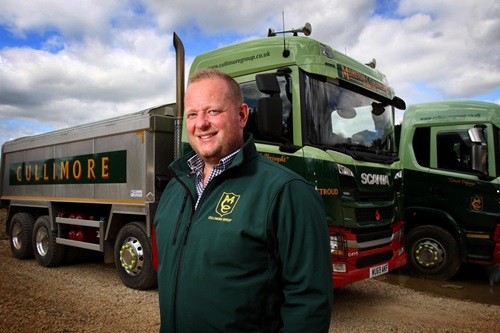Cullimore Group managing director Moreton Cullimore recently won a planning appeal to create a 160-acre quarry to futureproof the longstanding independent aggregates and haulage supply business based in Gloucestershire, western England. Moreton tells Guy Woodford how his successful appeal marks the end of a traumatic saga.
It was a needlessly drawn-out planning battle that many of Aggregates Business’s independent small-to-medium-sized quarry business owners can easily relate to. An industry entrepreneur seeks to safeguard the future of his £15 million turnover business and its nearly 100-strong workforce by developing a site he owns, only for bungling council officialdom to threaten his cogent and carefully considered plans.
Moreton Cullimore’s formal planning application to open a new high-quality sand and gravel quarry on a site close to the M50 and M5 on the Gloucestershire-Worcestershire border was initially submitted in November 2019. Given that the proposed quarry straddled county borders, approval was needed from both Worcestershire and Gloucestershire County Councils. The former approved Moreton’s application in November 2022, but the latter rejected it two months later.
“In January 2023, my planning application went before Gloucestershire County Council’s planning committee with the council officers’ recommendation to approve. There were no statutory objectors other than local parish councils. There had been a public exhibition of the plans in March 2019, with us doing two years of work before that. The application would have gone to the planning committee a year earlier, but someone [at the county council] forgot to upload one of my application appendices to the public portal. A decision on my application got delayed due to an administrative error.”
Adding to Moreton’s frustration during the subsequent year’s delay in processing his planning application was Gloucestershire County Council approving a new quarry planning application by one of his competitors. “A year’s disruption to a business like us is massive. Most of the intended quarry site is in Worcestershire, and Worcestershire county councillors unanimously passed the bulk of my application. The Gloucestershire part that was subsequently refused was an area for the wash plant, lagoons, a concrete plant and the main entrance off a main road,” explains Moreton, the sitting and youngest-ever chair of the Road Haulage Association (RHA).
Moreton felt it was clear a decision had been made by Gloucestershire county councillors before the planning committee sat as all the decisions they were giving to refuse his application were “not within the framework within which they can make their decision.”
He continues: “When it came to the vote, none of the county councillors were clear on what they were voting for based on the committee chairman’s summary of the discussion. When the councillors’ decision was becoming clear, the county council’s legal advisors adjourned the meeting and said, ‘You cannot make your decision based on the reasons you are giving.’ The councillors argued that Gloucestershire County Council had set out its move to net zero and that approving another quarry didn’t sit with their net-zero principles. This completely ignored that a new quarry would bring mineral products much closer to required local infrastructure development, thus reducing emissions. The county councillors also said there had been no economic impact assessment of a new quarry in the immediate local area. That’s not in a framework for any planning application and was also only raised as a potential concern just 36 hours before the planning committee sat.”
Moreton said cameras streaming the planning committee meeting to interested public members via the Gloucestershire County Council website were turned off after the legal advisors adjourned the planning committee to convey their advice to its members. “The legal advisors told the committee, with members of the public in the room watching from the viewing gallery, that if they made a decision based on the reasons they had given, the applicant would likely appeal and would highly likely win the appeal. They reconvened the meeting and refused my application for the same reasons. It was like something out of Blackadder!”
After the planning committee meeting. Moreton told Gloucestershire County Council that he would be appealing. “I asked if they wanted to get in a room and discuss things to resolve the matter as quickly and easily as possible, but they flatly refused to. I then pushed for a full public inquiry after instructing a KC [King’s Counsel]. When I first met him, the KC’s opening words were, ‘Moreton, I’m sorry you have to meet a guy like me, as you shouldn’t be in this position.’

“When we lodged our appeal, the county council took seven weeks to respond. They then said they would not defend against my appeal and that they would rather the matter not be resolved by a full public inquiry. In short, within four months of refusing my application, they turned round by way of a letter and said, ‘We know we got this wrong, and we’re not going to resist your appeal’. We then just had to wait until we got an appeal date.
“In the interim, I learned that the planning committee had been put through some further training, and another of my competitors in the same county had a quarry planning application approved. It beggared belief.”
Moreton’s appeal was upheld after an undefended day-long hearing. The Planning Inspector said councillors had acted “unreasonably” in refusing Moreton’s proposals, failing to substantiate their claims that the quarry would harm the local economy and go against the county council’s net zero agenda.
In addition to losing the appeal, Gloucestershire County Council has also been ordered to pay Moreton’s full costs for arguing what turned into a four-month-long appeal case.
“You are left dumbfounded by the system. It’s cost me the best part of 18 months,” says Moreton. “While we’ve been awarded my nearly £200,000 appeal costs, the real economic cost to my business over those 18 months is around four times that. My company has had to buy extra mineral materials from third parties for the last two years to meet our needs. That only covers basic minimum requirements and is not to tender for bigger projects. Everyone is short of mineral materials in this part of the world. There’s just not enough to go around. Gloucestershire County Council does not understand that 50-60% of its mineral materials are imported from Wiltshire.
Speaking to Aggregates Business from his office at The Cullimore Group’s Netherhills HQ, nine miles southwest of Gloucester, Moreton describes his appeal win as “bittersweet". “It’s winning a battle you should never have had to fight. It has had dire consequences, and we will never get any compensation for that. It shows what challenges small-to-medium-sized quarry operators are up against.”
When asked if the Cullimore Group has had to make redundancies due to the planning dispute, Moreton says, “I swore after I had to lay off some good people during the financial crises of 2008 and 2009 that I would never do it again. I have managed to keep to my word, but we haven’t replaced people who have left to go to other employment or retired.
“Our turnover has shrunk massively. Last year, we sold 50% less mineral materials just as interest rates, diesel, and energy prices increased. As the Russia-Ukraine war started, we came out of our energy contracts. We went from paying £190,000 for our electricity to £800,000. We had to tighten our belts in all areas. This included ending all our local charitable activities and sports team sponsorships.”
The Cullimore Group’s land in the Gloucestershire village of Twyning, equivalent to around 100 football pitches, can now be turned into Bow Farm Quarry. Moreton says his company aims to extract around 1.5 tonnes of sand and gravel from the quarry over nine years.
The extracted material will be used to build homes, schools, retail businesses, and other facilities, along with the A417 Missing Link, improving the connection between two dual carriageway sections of the A417 at Brockworth and Cowley, and various developments in Tewkesbury and Cheltenham.
“Bow Farm Quarry is in north Gloucestershire and south Worcestershire, and all of Gloucestershire’s housing, retail, and other infrastructure development is around Tewkesbury and Cheltenham. It includes the £1 billion tech [Cheltenham Gold Valley] development next to GCHQ, less than ten miles from our new Bow Farm Quarry. Currently, the mineral materials for those works are being imported from North Wiltshire towards Swindon. By truck, that’s an hour and a half away. It is just 20 minutes from our new quarry. We can offer a much more sustainability-minded solution.”
Moreton says that although he is optimistic about The Cullimore Group’s next trading phase, the business could benefit from the UK economy “switching on.”
“In a recent RHA-related conversation with a shadow government minister, I mentioned that in 2019, we were a million new homes behind where we needed to be. That situation didn’t improve during COVID-19, as industries shut up shop. No one is building homes as no one wants mortgage deals; renting is cheaper. I asked what Labour would do if they got in to move the economy on. The shadow government minister said they wanted to build 1.5 million homes quickly. They would say that at this point of the parliamentary cycle, but even if the economy switches on, in construction, it will be three to six months before anyone experiences any benefit from that. Sadly, 500 British haulage firms went out of business last year. The RHA is predicting over 600 more will cease trading this year. That’s record numbers."

From a quarrying perspective, Moreton continues: “In our case, taking five years to access 1.5 million tonnes of mineral materials and then only being able to process 200,000 tonnes of that a year due to regulatory requirements to restore one phase before accessing the next slows your growth potential.
“For Bow Farm Quarry, we’ve got the most pre-extraction commencement conditions on a site we have ever seen. We will spend the next few months meeting these conditions and putting in a proper entrance off the A38 with the right signage and displays. Then we need to erect the wash plant and the concrete plant, and install the haul roads and other infrastructure to get to the [quarry extraction] phases. I don’t think we’ll be extracting material until spring or summer 2025.
“The problem is that everything now seems to be taking that much longer. You can’t get anything done quickly. For example, if you need the power people to come out, they won’t come out in two weeks, but they will come out at some point in the next two and a half months. It feels that the rest of the world is moving much faster than us, and we need to draw the line and address this.”
A spokesperson for Gloucestershire County Council said: “We note the Inspector’s report and decision in relation to Bow Farm, including the award relating to the plaintiff’s costs, and have been actively engaging with the applicant accordingly.”








